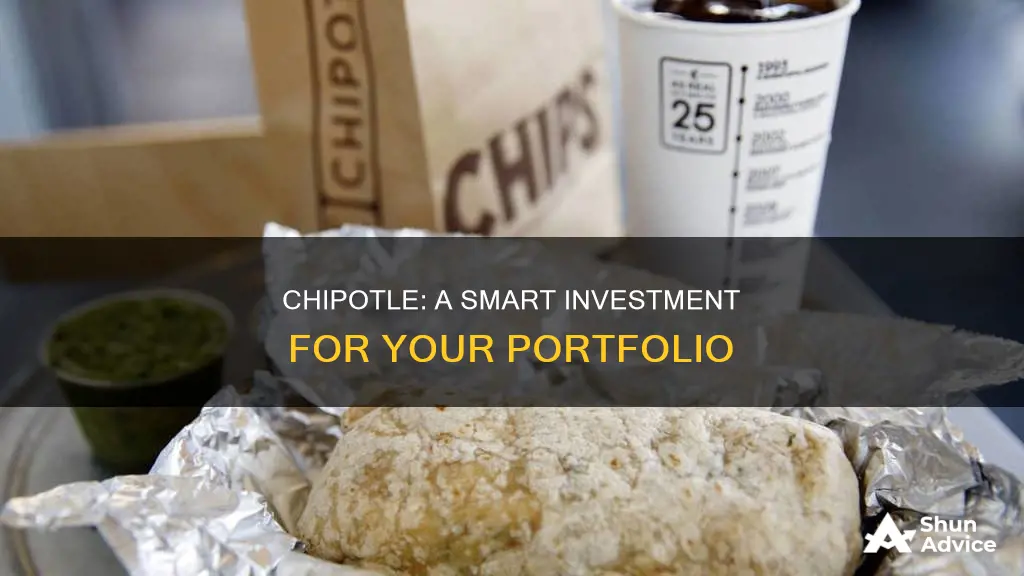
Chipotle Mexican Grill (CMG) is one of the fastest-growing restaurant chains in North America. The company has successfully tapped into the Millennial market while rapidly expanding its footprint. As a result, Chipotle has attracted the attention of retail investors and billionaire hedge fund managers alike.
In its 2022 third quarter, Chipotle generated revenue of $2.2 billion, a 13.7% increase from the previous year. Same-store sales, which measure comparable revenue for stores open at least 13 months, jumped 7.6%. And diluted earnings per share increased 28.1% compared to Q3 2021.
Chipotle's restaurant-level operating profit margin improved to 26% of sales from 25% a year ago. Overall profitability rose to a healthy 16% of sales from 15%, too. This translated into a 20% spike in adjusted earnings this quarter.
Chipotle's long-term expansion plans include its so-called Chipotlane feature, a drive-thru lane that allows customers to place their orders via the company's mobile app before picking up their food. In 2022, digital sales accounted for 39.4% of the company's total revenue.
Chipotle maintains a strong buy rating, with 21 out of 34 analysts rating the stock as a buy. The company's share price has risen 347% over the past five years, and the stock has started 2023 strong, with shares up nearly 40% so far this year.
What You'll Learn

Strong financial results and growth potential
Chipotle Mexican Grill has demonstrated strong financial results and growth potential, making it an attractive investment opportunity. The company's financial performance has been impressive, with a year-to-year revenue growth rate of 14.3% in fiscal year 2023, resulting in a total revenue of $9.9 billion. This growth has been driven by a combination of comparable restaurant sales increases, new restaurant openings, and digital sales.
Chipotle's ability to expand its restaurant reach is evident through its consistent annual growth of 6% since 2016, leading to a doubling of its revenue in 7 years. The company is on track to achieve its goal of 7,000 restaurants by 2033, with the potential to reach this target even earlier. This expansion strategy has contributed to its impressive compound annual growth rate (CAGR) of 15.6% from 2023 to 2033.
In addition to its revenue growth, Chipotle has also demonstrated strong earnings performance. In the fourth quarter of 2023, the company reported a diluted earnings per share of $10.21, a 27.3% increase from the previous year. For the full year 2023, the diluted earnings per share were $44.34, representing a 38.4% increase. This growth in earnings can be attributed to higher comparable restaurant sales, new restaurant openings, and effective cost management.
Chipotle has also shown resilience in the face of inflationary pressures and macroeconomic concerns. Despite rising costs for key food inputs, the company has successfully raised menu prices to offset these impacts, with minimal resistance from customers. This pricing power has allowed Chipotle to maintain its strong financial performance and profitability.
Furthermore, Chipotle's focus on digital innovation and convenience has contributed to its growth potential. The company has been actively digitizing its restaurant kitchens, expanding partnerships with third-party delivery services, and building more Chipotlanes for digital customer orders. These initiatives have resulted in a significant portion of digital sales, representing 36.1% of total food and beverage revenue in the fourth quarter of 2023.
In conclusion, Chipotle Mexican Grill's strong financial results and growth potential make it a compelling investment opportunity. The company's consistent revenue and earnings growth, expansion plans, pricing power, and digital innovations position it well for continued success and make it a favourable choice for investors seeking long-term growth.
Young Investors: Emulate Warren Buffett's Strategy
You may want to see also

Ability to raise prices without losing sales
Chipotle has proven its pricing power by raising menu prices several times over the past few years, with sales still rising at a solid clip. In 2021, the fast-casual chain raised prices by about 4%, making the average meal 30 to 40 cents pricier. In the first quarter of 2022, Chipotle again raised prices by 4%. Despite these price hikes, sales were up 16% year over year, with almost half of those sales coming from digital orders.
Chipotle's ability to raise prices without losing sales can be attributed to its strong value proposition. CEO Brian Niccol pointed out that the company's value proposition remains strong, and they experienced minimal resistance to their price increases. This is in part due to Chipotle's effective strategies in hiring and training practices, food quality, and faster service.
The company's pricing power is also influenced by industry trends and the economic environment. Inflation has pushed up prices for key ingredients like avocados, tortillas, beef, and dairy, impacting the chain's margins. Chipotle's CFO, Jack Hartung, noted that they would continue to monitor inflation and the economy when considering future price increases.
While Chipotle's success in raising prices without losing sales is notable, it's important to consider the potential risks. The company's executives have expressed their reluctance to continue raising prices and hope to avoid further increases if costs stabilise. Additionally, it's worth noting that competitors like McDonald's are expanding at a faster rate, which could impact Chipotle's market share.
Madoff Victims: A Long List of Investors
You may want to see also

Expansion plans and new store formats
Chipotle Mexican Grill is planning to expand its North American footprint from 6,000 locations to 7,000 units. This expansion is largely fuelled by the chain's success in smaller towns, where it benefits from cheaper leases without compromising customer demand. In 2022, the company opened 235 to 250 new locations and plans to accelerate its pace of new units to a range of 8% to 10% annually starting in 2023.
Chipotle's expansion strategy includes a focus on "Chipotlanes," which are drive-thru lanes dedicated to picking up digital orders only. The company aims to have at least 80% of its new restaurants include these Chipotlanes. The introduction of Chipotlanes has demonstrated higher sales volumes and greater returns compared to traditional Chipotle restaurant formats. The smaller footprint of Chipotlane Digital Kitchen stores also allows Chipotle to enter more urban areas that couldn't support a full-size restaurant.
In addition to its expansion plans, Chipotle is also testing new store formats. The company is experimenting with digital-only kitchens, such as the Chipotle Digital Kitchen, which has no dining room or front service line. These digital-only locations are designed to accelerate the company's digital business in non-traditional locations and provide flexibility with future locations. Chipotle is also working to improve its delivery and curbside service options.
The company's expansion and new store formats are part of its strategy to cater to varying customer needs and drive growth. By investing in technology and innovative formats, Chipotle aims to enhance the customer experience and make the brand more convenient and accessible.
BlackRock: Investors' Choice
You may want to see also

Strong brand and popularity among younger diners
Chipotle Mexican Grill has become one of the most popular restaurant chains in the US, with a strong brand and a loyal following among younger diners. The company's marketing message centres on being "visible, relevant and loved".
Chipotle's popularity among younger consumers can be attributed to several factors. Firstly, the company's commitment to serving ethically and naturally produced food has resonated with younger audiences who value healthy and organic options. Chipotle's "food with integrity" motto, inspired by founder Steve Ells' concerns about American food production, has been a key driver of its success. The company's no-GMO policy, instituted in 2013, further reinforced its dedication to food quality.
Secondly, Chipotle's small menu has been a strategic decision that sets it apart from other fast-food restaurants. A limited menu reduces the chances of food spoilage, ensures quicker service, and provides customers with a clear understanding of the offerings. This approach also allows for customisation, as Chipotle will make anything a customer desires if the materials are available. This has led to the creation of secret menu items like the Quesarito and Chipotle Nachos.
Additionally, Chipotle's social media presence, particularly on TikTok, has helped it develop a cult following among younger consumers. The company's focus on platforms like TikTok and its engagement through challenges like the #GuacDance or "Lid Flip Challenge" have contributed to its popularity.
Chipotle's strong brand and popularity among younger diners are evident through various metrics. Brand awareness of Chipotle Mexican Grill in the US is at 82%, and among those who know the brand, 38% like it. The company's usage share is also impressive, with 24% of restaurant chain customers in the US using Chipotle, translating to a loyal customer base.
Chipotle's ability to connect with younger diners through its values-driven messaging, efficient operations, and innovative marketing has contributed to its strong brand and popularity in this demographic.
Investing: Timing the Market
You may want to see also

No long-term debt
Chipotle Mexican Grill's total long-term liabilities for the quarter ending March 31, 2024, were $4.05 billion, a 10.2% increase year-over-year. This is classified as a short and long-term debt total. However, Chipotle's debt-to-equity ratio is 0%, indicating that it is debt-free.
The debt-to-equity ratio is a measure of a company's financial leverage, calculated by dividing its long-term debt by stockholder's equity. A high debt-to-equity ratio usually indicates that a company is highly leveraged, which can increase the risk associated with the company's operations and lower its financial flexibility.
Chipotle's debt-free status means that it does not need to rely on operating cash flow to cover debt, and interest coverage is not a concern. This can be considered a positive indicator for investors, as it suggests that the company is in a stable financial position and is not burdened by interest and principal payments on loans.
Additionally, Chipotle's short-term assets ($1.7 billion) exceed its short-term liabilities ($1.1 billion), indicating that its current assets are properly aligned with its current liabilities. This is an important consideration for liquidity, ensuring that the company can meet its financial obligations.
In summary, Chipotle's lack of long-term debt contributes to its financial health and stability, reducing potential risks for investors.
Tomorrow's Investments: Where to Look
You may want to see also
Frequently asked questions
In 2022, Chipotle's revenue increased by 14.4%, with comparable restaurant sales rising by 8%. Q4 revenue was $2.2 billion, 11% higher than the same period in 2021.
Chipotle's long-term growth strategy includes its "Chipotlane" feature, a drive-thru lane that allows customers to place orders via the company's mobile app. In 2022, digital sales accounted for 39.4% of the company's total revenue.
Chipotle plans to open 250 or more restaurants in 2023, with a long-term goal of reaching 7,000 locations across North America.
The stock's price reflects high future growth expectations, and if circumstances prevent the company from executing its expansion plans, investors could be holding overvalued shares. Additionally, Chipotle's pricing strategy to counter inflation may be pricing out lower-income diners, leading to fewer transactions.







